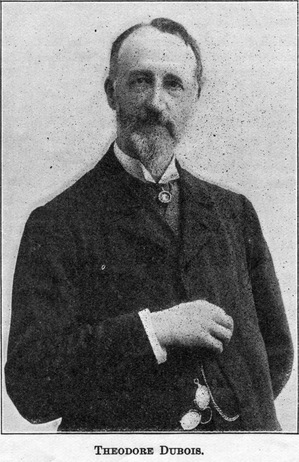 Theodore Dubois was born in Rosnay, Maine, August 24, 1837. He entered the Paris Conservatory at the age of 16, studying under Marmontel, Benoist, Bazin, and Ambroise Thomas, graduating in 1861 as “Prix de Rome” with the cantata Atala, after taking first prizes in all the departments. Returning from Rome he settled in Paris and became Maître de Chappelle at Sainte Clotilde, and later succeeded Saint-Saëns at La Madeleine. In 1871 he was made professor at the conservatory. In 1891 he succeeded Léo Délibes as Professor of Composition, and in 1894 he was elected to the chair at the academy made vacant by the death of Gounod. In 1896 he succeeded Ambroise Thomas as Director of the Conservatory, and was made an officer of the Legion of Honor.
Theodore Dubois was born in Rosnay, Maine, August 24, 1837. He entered the Paris Conservatory at the age of 16, studying under Marmontel, Benoist, Bazin, and Ambroise Thomas, graduating in 1861 as “Prix de Rome” with the cantata Atala, after taking first prizes in all the departments. Returning from Rome he settled in Paris and became Maître de Chappelle at Sainte Clotilde, and later succeeded Saint-Saëns at La Madeleine. In 1871 he was made professor at the conservatory. In 1891 he succeeded Léo Délibes as Professor of Composition, and in 1894 he was elected to the chair at the academy made vacant by the death of Gounod. In 1896 he succeeded Ambroise Thomas as Director of the Conservatory, and was made an officer of the Legion of Honor.
Besides several operas, cantatas, ballets, etc., Dubois has composed a great deal of organ-music, being perhaps next to Guilmant in popularity. His best-known organ-works are Toccata in G, Messe de Mariage (five pieces), Fait Lux, In Paradisum, and Cantilene Nuptiale. He also published a Fantasie-Triomphale for organ and orchestra, Meditation (prayer), for strings, oboe, harp, and organ, as well as two sets of duos for piano and harmonium.



